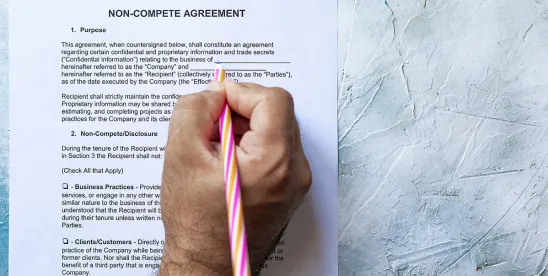Aputative class action recently filed in Seattle, Washington, against a solar energy equipment company could be the first lawsuit to test the bounds of the state’s relatively new restrictions on noncompetition agreements for lower-wage employees.
The lawsuit, filed on May 19, 2023, in King County Superior Court, alleged the company violated the law by requiring employees to sign agreements that prohibited them from taking a second job or working for a competitor after leaving the company. But the suit not only seeks to stop the enforceability of the agreements but statutory damages as well, meaning the result could have major implications for employers in the state.
Quick Hits
-
A recently filed putative class action could be the first to test Washington’s 2020 noncompte agreement restrictions.
-
The suit highlights concerns for employers regarding potentially overly broad noncompetition agreements.
Saraceno-Oliveri v. Solgen Power LLC
The putative class action against Solgen Power LLC alleges that Solgen required one of its employees, Ethan Saraceno-Oliveri, and other employees to sign noncompete agreements even though they were paid substantially less than the minimum thresholds under Washington’s 2020 noncompete law.
According to the allegations in the complaint, the company’s noncompetition agreements prevented employees from working for competing companies for two years following their discharge. The agreements also prevented employees from seeking outside employment, or moonlighting, even though they earned less than the income thresholds for such an agreement under state law.
The complaint alleged that the “noncompetition covenants unreasonably restrict[ed]” class members’ “ability to work,” and were required as a condition of employment and without independent consideration. The lawsuit seeks a declaration that the agreements violate state law and are void and unenforceable, a permanent injunction blocking the employer from enforcing such agreements, and an award of “actual damages and/or statutory penalties” in addition to attorneys’ fees and costs.
Noncompetes in Washington
Prior to 2020, Washington noncompetition agreements were generally enforceable under Washington law if they were “no broader than necessary to protect an employer’s legitimate protectable interests.” That language was generally understood by Washington courts to mean noncompetition covenants are enforceable if necessary to protect the employer from unfair competition, for example, in connection with potential theft of trade secrets or employer/customer relationships that were developed or expanded by the employee for the benefit of the employer.
However, under a Washington law passed in 2019, which took effect on January 1, 2020, noncompetition agreements can be enforced only against employees who earn $100,000 or more based on an employee’s income reported in Box 1 of Internal Revenue Service (IRS) Form W-2 and independent contractors earning more than $250,000 as reported on a Form 1099. Each minimum compensation threshold is adjusted annually for inflation. (The current thresholds for 2023 are $116,593.18 for employees and $291,482.95 for independent contractors.)
Notably, an employer may violate Washington law for any attempt to enforce a pre-2020 covenant or any attempt to require the employee to enter into an improper noncompetition provision after January 1, 2020. An employer may be considered to have violated the law even if the employee refuses to sign, or if the employer declines to enforce the agreement, a violation would take place when the employer improperly asks the employee to enter into the agreement.
Further, distinct from the noncompetition aspects of the 2020 law, the law prohibits employers from restricting employees who earn less than twice the applicable state minimum wage from seeking outside employment unless the employer can show that the outside employer raises safety concerns or interferes with reasonable scheduling expectations. The law further is not meant to alter the common law duty of loyalty to an employer.
Next Steps
The new putative class action is one of the first to test Washington’s relatively new restrictions on class actions, which could have major implications for employers. It remains to be seen whether the fact or legal allegations in the complaint will withstand scrutiny, but the fact of the filing serves to highlight the risk faced by employers in Washington. Notably, the noncompete law opens the door to potential damages of effectively a minimum of $5,000 per person who is asked to sign or who does sign an unenforceable agreement, plus attorneys’ fees and costs.
Still, the Washington law does not ban such agreements in all contexts, and properly drafted and applied agreements may still be enforceable. Further, the limits do not apply to other common employment agreements, including confidentiality agreements, agreements prohibiting the disclosure of trade secrets, and certain narrow types of nonsolicitation agreements.
Employers in Washington may want to review their use of noncompetition agreements and the types of covenants they include in employment agreements to ensure that they are enforceable and do not open them up to potential liability including potential class action litigation.
Ogletree Deakins will continue to monitor developments will provide updates on the Washington and Unfair Competition and Trade Secrets blogs as additional information becomes available. Important information for employers is also available via the firm’s webinar and podcast programs.






 />i
/>i

